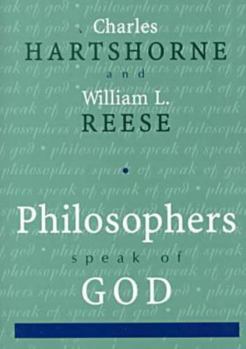Philosophers Speak of God
Select Format
Select Condition 
Book Overview
This wide-ranging anthology of philosophical writings on the concept of God presents a systematic overview of the chief conceptions of deity as well as skeptical and atheistic critiques of theological ideas. The selections cover key philosophic developments in this subject area from ancient times to modern in both the East and West. Editors Hartshorne and Reese-two of the most highly respected scholars in the philosophy of religion-have not only selected...
Format:Paperback
Language:English
ISBN:1573928151
ISBN13:9781573928151
Release Date:March 2000
Publisher:Humanities Press Intl
Length:535 Pages
Weight:0.05 lbs.
Dimensions:1.2" x 5.4" x 8.3"
Customer Reviews
3 ratings
An Important Reissue on Panentheism
Published by Thriftbooks.com User , 19 years ago
This popular book, which was published by the University of Chicago Press in 1953, is reissued by Humanity Books. This reissue is timely because Hartshorne passed on in 2000. The reissue is also timely because Americans still do not understand dialectical thinking, the early dialecticians such as Plato and Nicholas of Cusa, the modern thinking in Germany today, modern panentheism, and modern dialecticians such as Charles Hartshorne. The Marxists also became dialecticians. But, they end up with a one-sided world because they turned away from God. Far East thinkers also became dialecticians. But, they turned to a mechanistic whole for the world and miss the spiritual activity of God through Christ. However, Americans will not gain this understanding until they limit the use of Aristotle's logic to subjects of Nature and stop using logic to describe God. This limit and stoppage is a complex language transformation and could take a few generations because Aristotle and British empiricism dominated the English language for many centuries. However, the material in this book will accelerate this transformation, especially if the reader reads the book several times and changes the color of underlines, marks, etc. with each readings. Multiple readings are important for any new material. Obviously, readings of Plato and Nicholas of Cusa will also help one understand the messages in this book by Hartshorne and Reese. Panentheism and this book can expect to increase our knowledge of the God who appears in our world.
Talk and Talk...
Published by Thriftbooks.com User , 21 years ago
Charles Hartshorne is one of the modern founders of process theology. A protege of Alfred North Whitehead, who plays a pivotal role in the foundation of process thought with his book Process and Reality. The particular subject here, Philosophers Speak of God, developed in partnership with William Reese, professor of philosophy at SUNY-Albany, is an anthology of philosophical writings from Western and Eastern sources. They span the almost the full span of human intellectual history. Hartshorne and Reese analyse and categorise the various writings, looking at underlying principles and commonalities, and overall patterns or systems. From the preface, the authors state: `this work aims to present -- by selections from some fifty writers ranging in time and space from Lao-tse, Plato, and Sankara to Whitehead, Berdyaev, and Radhakrishnan -- the chief philosophical conceptions of deity. It also aims to aid readers in estimating the validity of these conceptions. The work is thus two things: (1) a book of readings in philosophical theology -- the first of its kind -- and (2) a systematic analysis and evaluation of theistic (and atheistic) idea.' One of the real values of this book comes in the introduction, in the classification system Hartshorne and Reese set up for identifying the philosophical attributes of the worlds religious and theological systems of thought. This classification system shows both historical and systematic significance in the frameworks investigated. The system rests on five key elements: E is for Eternal Is God seen as eternal in some or all aspects of God's own reality, unchanging? T is for Temporal Does God change in some or all aspects? Is God capable of change? C is for Consciousness Is God conscious and self-aware? K is for Knowing Is God aware of the world? Does God know all there is? W is for World-inclusive Do all things have their being in God? Are all things God? These are not all-for-once questions in the framework of this book. Rather, each will participate in different ways in looking at the theological texts provided. There are certain rules -- for instance, every combination will begin with E or T or ET, where the eternal and the temporal apply toward different aspects of God. Panentheism, where Hartshorne places Whitehead (and hence, himself) involves all five elements. Placing different theologies becomes an interesting exercise: Aquinas belongs in a framework of ECK, for instance -- Aquinas doesn't allow for change or inclusion of the world in God, which is heavily influenced by Aristotle, whose classification is as EC. For those interested in philosophy of religion, this classification system alone would make the book worthwhile. However, the substance of the book rests in the anthology section. Divided into three sections -- Classical views, Modern Views, and Skeptical or Atheistic Views -- the book covers theologians and theological families using the classification system set up. One of the positive element
Excellent intro to process philosophy
Published by Thriftbooks.com User , 24 years ago
Lucid, comprehensive and inexorable in its logic, "Philosophers Speak of God" remains one of the best summations of the philosophy of Charles Hartshorne and Alfred North Whitehead. I first read it in Dr. Hartshorne's last official university class, more than two decades ago, and it is still the one I turn to for a clear and concise explanation of Hartshorne's take on the classical philosophers. Hartshorne and Reese cover most of the major Western and a good number of the major Eastern philosophers in this wide-ranging analysis of the primary tenets of theology. I recommend this for anyone who is first reading about process philosophy, and wishes to understand the differences between classical thought and the panentheist approach.





